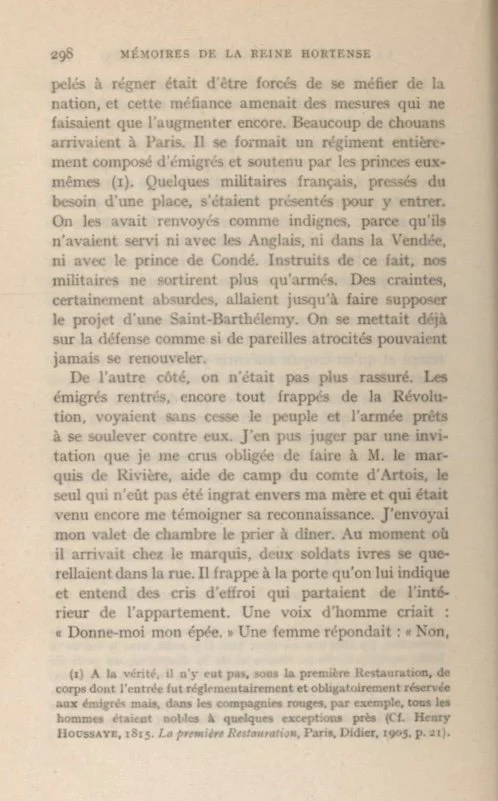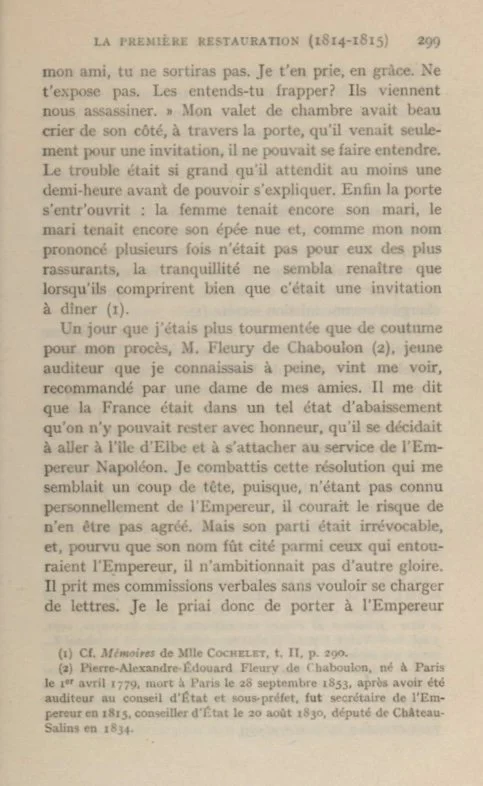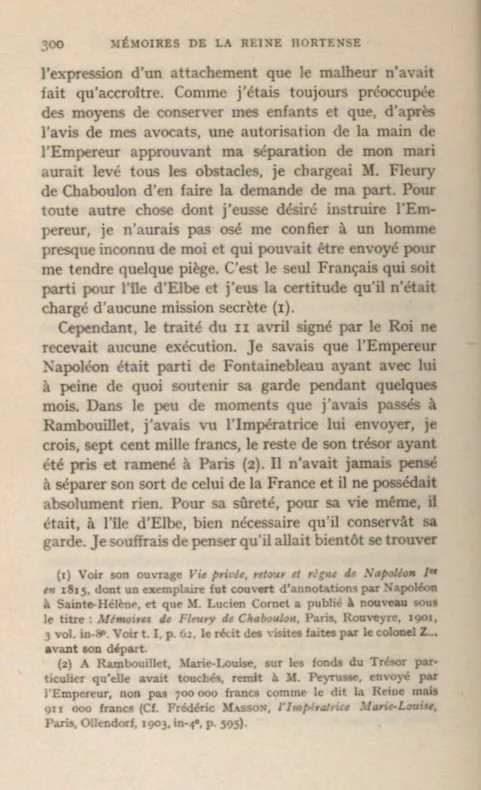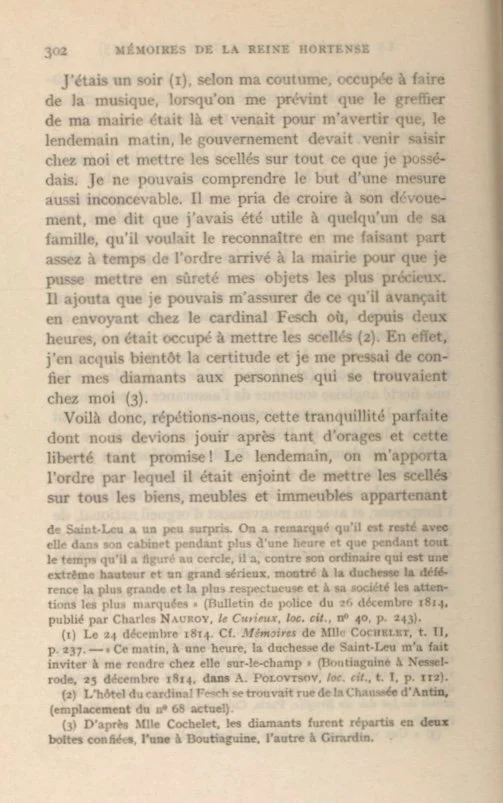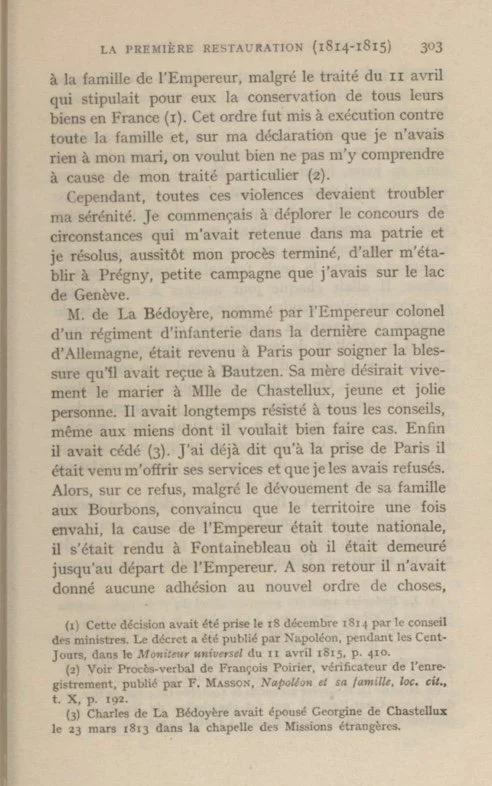Let’s have another look at Hortense’s Memoirs. If you want to read the book it is available for free at the side bar in English and French. Use the widget on the sidebar to translate the text below into pretty much any language.
Terrorism is a way for very unpopular rulers to stay in power. They must always keeping increasing that climate of fear until it gets completely ridiculous. This form of rule is not sustainable which only increases their fears and the absurdity of the policies they force on the public.
In this passage, we see that the new government does nothing to honor the treaty they agreed to and authorized but rather they move in instead to steal from Hortense and the other members of her family.
Hortense’s memoirs continues:
Many Chouans came up to Paris. They formed themselves into a separate regiment entirely composed of former exiles whom the princes themselves protected. Several former French officers who were in need of a post attempted at once to join.
Their request for admission was rejected as undesirable because they had not fought in the English Army, or in the insurrections in La Vendée or with the Prince of Condé. On being informed of this fact our officers always went out armed.
Fears, which were certainly absurd, were entertained that we were on the eve Saint Bartholomew. People took precautions as though it were possible for such atrocities ever to be repeated.
Nor was the other party more reassured. The emigrants had returned to France, and whose minds were still filled with recollections of the Revolution, imagined constantly that the army and the working classes were on the point of uniting against them.
I had an indication of this in connection with an invitation I felt obliged to send Monsieur le Marquis de Riviere. aide-de-camp to the Comte d'Artois and was the only person who had not been ungrateful toward my mother; he had even renewed his expressions of gratitude to me.
I sent my valet de chambre to invite him to dinner.
Just as my servant arrived at the house of the Marquis two drunken soldiers were quarreling in the street.
He knocked on the door of the apartment and heard exclamations of dismay from within. A man's voice exclaimed, "Bring me my sword."
A woman answered: "No, you must not go out; I implore you, do not risk your life. Don't you hear them knocking? They have come to assassinate us."
Although my servant kept calling from the other side of the door that he had only come with a dinner invitation he could not make himself understood.
The commotion was so great that it was hour before he managed to explain. At length the door opened and revealed the wife still holding onto her husband, the husband still grasping his naked sword, and as my name, which had been pronounced several times, did not by any means reassure them, calm was not reestablished until they had fully grasped the fact that it was merely an invitation to dinner.
One day when I was even more worried than usual about the result of my lawsuit, Monsieur Fleury de Chaboulon, a young auditor whom I hardly knew, called on me with a recommendation from the lady in waiting of one of my friends.
He said to me that France had fallen so low it was impossible for a man of honor to remain there any longer, and he had therefore decided to go to Elba and take a position in the service of Emperor Napoleon.
I urged him to reconsider his decision, which seemed to me to be an impulsive one, for as the Emperor had never met him, he ran the risk of not proving acceptable. But he had made up his mind to carry out his plan. As long as his name would be included among those of the people who had served the Emperor, he desired no other recompense or glory.
He undertook to deliver various verbal messages for me, but declined to carry anything in writing. I therefore asked him to assure the Emperor of my devotion, which his misfortunes had only increased.
Since I was constantly seeking means which would help me keep my children with me, and since, according to what my lawyers said, an authorization in the Emperor's handwriting approving my separation from my husband would have removed all possible obstacles, I requested Monsieur Fleury to secure this for me.
In regard to any other matter about which I should have wished to communicate with the Emperor I should never have dared confide it to a man whom I scarcely knew and who might have been sent to me to lead me into a trap.
This was the only Frenchman who ever set out for Elba, and I am sure he had no secret mission of any kind. Meanwhile nothing was being done toward executing the treaty of April 11, which the King had signed.
I knew that the Emperor when he left Fontainebleau had scarcely enough money with him to pay his expenses for a few months. During the few moments I had spent at Rambouillet I had seen the Empress send him a sum of I believe, seven hundred thousand francs, the rest of his personal funds having been seized and taken back to Paris. He had never thought to make any separate provision for himself, considering his lot bound up with that of France, and he had no private means of any kind.
For his safety, for his personal protection even, it was absolutely necessary he maintain his body-guard. The thought that he might shortly find himself obliged to dismiss it, because the treaty he had signed was not being carried out, was painful to me.
I felt myself in a way authorized by my position in France to act on his behalf; but to whom should I address myself? Who had the power to give him what he was justly entitled to? Monsieur Pozzo di Borgo no longer came to my house. Lord Wellington was the English Ambassador in Paris.
He gave brilliant entertainments, did the honors of the capital and seemed to be its ruler. He had asked through Madame Recamier to be presented to me at my home. I took advantage of this opportunity in the hope that as a generous enemy he would perhaps consider it due to his own honor to supervise the execution of treaties of which his government was one of the signatories.
I received him and, on another occasion, asked him to dine. Beneath an exterior which at first seemed to lack distinction it was easy to see that he possessed that pride so characteristically English based on a knowledge of his personal merits.
He had that keenness of glance which indicates greater ability as an observer than as a creative genius, and this caused him to resemble a diplomat rather than a military leader. He spoke to me in a tone of chilly admiration regarding the Emperor's great military gifts and alluded with a touch of national pride to the obstinacy with which England had declined to recognize him.
He blamed the French government for not having fulfilled the conditions stipulated in the treaty with the Emperor and assured me he would again call their attention to the sacred character of their obligations.
One evening while I was at the piano as usual word was brought me that the clerk of my municipal parish had come to announce that the following morning the government would take possession of all my property and attach everything I owned.
I could not understand the reason for such an astounding act. He begged me to believe his personal devotion to my interests, because I had once chanced to do something for a member of his family.
He wished to prove this by informing me what was to take place sufficiently in advance to give me time to remove my most precious belongings to a place of safety. He added that I could verify the truth of his statements by sending someone to the house of Cardinal Fesch where for the last two hours the officials had been engaged in placing the official seal on all the Cardinal's property.
This I did and found out that the information was true. I therefore hastened to entrust my diamonds to the persons who happened to be present.
This was what had become of that perfect tranquility which I had been planning to enjoy after all the storms I had weathered. This was the liberty I had so eagerly desired. The following morning, I received the official announcement that the seals were to be affixed to all the property, furniture and real estate belonging to the members of the Emperor's family. And this in spite of the treaty of April 11 which had stipulated that they could keep their property in France.
The order was carried out as regards all members of the imperial family, but on my declaring that I had nothing which belonged to my husband it was admitted that I should not be included on account of the clause covering my special case.
Nevertheless, all these violations of the treaty contributed to disturb my peace of mind. I began to regret the combination of circumstances which had caused me to remain in my own country and I resolved as soon as my lawsuit was over to withdraw to Pregny, a little estate I owned on the shores of Lake Geneva.
The original French is available below:


